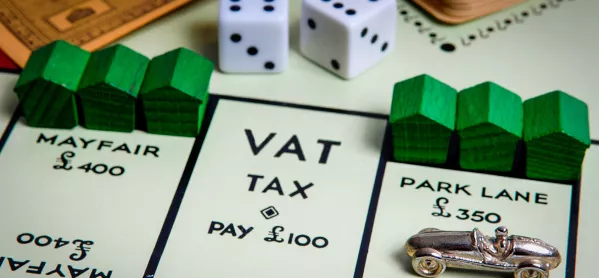VAT on private schools could raise ‘little’ cash for state sector

Adding VAT to private school fees could raise “very little” extra money to spend on state education if a quarter of pupils leave the independent school sector as a result, a think tank has said.
Forcing private schools to charge VAT on their fees is also likely to have the smallest impact on the most expensive schools and the wealthiest parents, according to a detailed analysis by education think tank EDSK.
In September 2021, the Labour Party said that, if elected, it would end the charitable status of England’s private schools, raising an estimated £1.6 billion from VAT and £100 million from business rates.
- Related: MPs vote down Labour’s private school tax bid
- Labour: Call for MPs to investigate private school tax status
- Background: Private school plan in 2019 Labour manifesto
The announcement sparked fierce public debate, with leading private school headteachers and others suggesting that it posed an existential threat to some independent schools.
But the EDSK paper, which provides a detailed analysis of how the £1.6 billion figure may have been reached, claims that the calculations are “flawed” and do not take into account a drop-off in demand for private schools if VAT is added to fees - which would require extra spending to educate these pupils in state schools.
The report says the projections also included adding VAT on fees for nursery-age children in private schools, even though no political party supports charging VAT on childcare for 2- to 4-year-olds.
In addition, the income projections simply added 20 per cent - the standard rate of VAT - to the fees of even the most expensive private schools, yet these are typically boarding schools and their accommodation is exempt from VAT.
The paper suggests that even under a best-case scenario - based on the projection that only 5 per cent of pupils would quit private schools - the addition of VAT to private school fees would only raise around £1 billion a year.
Under a worst-case scenario - in which 25 per cent of pupils leave private schools - adding VAT to fees would raise very little new revenue, especially when additional administration costs for HMRC are taken into account.
The think tank also warns that forcing private schools to charge VAT on their fees may lead to several unintended consequences, including some wealthier parents choosing to pay school fees in advance before Labour came to power.
Private schools forced to charge VAT on fees may also become eligible to reclaim any VAT that they have incurred on recent large “capital” projects. For example, those private schools that have built facilities such as new swimming pools and sports halls over the past decade could be in line for an unexpected tax windfall.
Tom Richmond, director of EDSK, former Department for Education adviser and author of the report, said: “Claims of £1.6 billion a year being raised from adding VAT to private school fees look far too optimistic, particularly if any more than a small number of pupils end up leaving private schools and moving to the state sector instead.
“What’s more, changing VAT rules with the sole aim of targeting private schools could lead to many unintended consequences that result in a government raising much less money than intended.”
Julie Robinson, chief executive of the Independent Schools Council (ISC), said: “These calculations show what we have been saying all along: Labour’s policy will not raise the money it claims.
“We would welcome the chance to work with all politicians to build on the good work already being done by our schools instead of penalising parents for making the choice of an independent school for their children.”
Francis Green, co-founder of Private Education Policy Forum (PEPF) and professor of work and education economics at UCL Institute of Education, said: “While raising some valid points, there are a few question marks over this analysis.
“Among these is the fact that the author seems to assume that many private school parents will pay upfront fees, which is in fact only possible for the very richest. It also fails to note that switches into the state sector are unlikely to happen immediately, with additional tax being paid in the interim.”
He added: “On balance, scrapping tax breaks for private schools would amount to a small, somewhat symbolic but overall positive step towards addressing the educational inequality caused by the two-tiered education system in England and Wales.”
A Labour source said the party “does not recognise the numbers cited in this report”.
They added: “We do not accept that the numbers of students leaving the sector would be anywhere near those cited this report, something which previous research from the respected Institute for Fiscal Studies has also been clear about.
“The report also assumes that money not spent on private schools would not be spent on other VAT-able goods and services”.
You need a Tes subscription to read this article
Subscribe now to read this article and get other subscriber-only content:
- Unlimited access to all Tes magazine content
- Exclusive subscriber-only stories
- Award-winning email newsletters
Already a subscriber? Log in
You need a subscription to read this article
Subscribe now to read this article and get other subscriber-only content, including:
- Unlimited access to all Tes magazine content
- Exclusive subscriber-only stories
- Award-winning email newsletters



